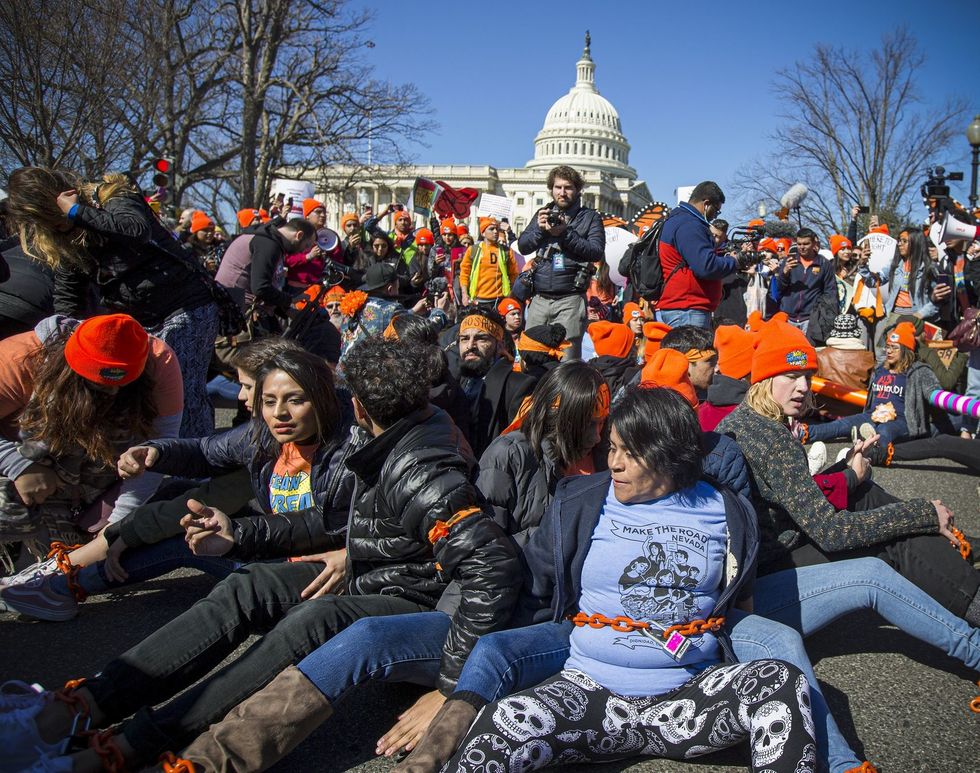Watergate is the ur-text for how Americans imagine the defeat of a sitting president, but it shouldn't be how to think about the impeachment of Donald Trump.
Watergate was a formative political experience for many of the older Democrats who run the House of Representatives these days. And the semi-fictionalized version of the scandal portrayed on film in All the President's Men is an emotional and intellectual touchstone for many journalists. To this day, it's conventional to denote the existence of a political scandal by appending "-gate" to a noun, as if "Watergate" had to with water rather than originating with a burglary at the Watergate Hotel.

1973 was a long time ago. The party system, the judiciary, and the media environment have evolved so much that there are no inferences to be applied to the present day — period.
American elites rarely seem to do this, but they should consider the lesson that toppled Mariano Rajoy's corrupt right-wing government in Spain in 2018, Park Geun-hye's corrupt right-wing government in South Korea in 2017, and Sigmundur Davíð Gunnlaugsson's corrupt right-wing government in Iceland in 2016: Large-scale public protests work.
Elected officials in the Democratic Party, like established politicians everywhere, aren't instinctively comfortable with the idea of popular resistance, but it's not an entirely alien concept to them, either. In the extreme political emergency of 2017, they embraced protest politics. That started with emergency mass demonstrations at airports to block Trump's initial travel ban, continued through the Women's March, and was seen repeatedly on Capitol Hill and in congressional town halls as people came out en masse to oppose repealing the Affordable Care Act.
A lawless government cannot be constrained by the institutions of the law alone. It is popular mass resistance that creates a crisis point and forces action. And if Democrats want to beat Trump's stonewalling tactics in 2019, they should consider doing it again.
Watergate was a long time ago
Watergate played out under a party system that was remarkably loose compared to today. Not all conservatives were Republicans, and not all Republicans were conservatives. That arguably set the stage for presidential misconduct to be evaluated as separately from political ideology or orientation as is possible.
Arch-segregationists — mostly Democrats — were serving openly in the halls of Congress. Meanwhile, the greatest champions of civil rights were also mostly Democrats, yet a liberal African American Republican represented Massachusetts in the Senate. Individual members faced cross-cutting ideological and partisan pressures, and even beyond race the system was only loosely organized with hawks and doves sitting in both parties.The judicial system was also much less polarized. There was no institution like the Federalist Society to organize a coherent conservative legal movement, and there wasn't an ideologically coherent party to install such a set of judges on the bench anyway.
Meanwhile, the media environment was dominated by three broadcast television networks whose nightly newscasts could between them essentially dictate "truth" to the mass public.

Defeating Nixon under those circumstances meant winning a series of difficult elite insider games. Historical happenstance meant that an unrelated scandal had recently elevated Gerald Ford — who had genuinely nothing to do with Watergate — to the vice presidency. Ford presented a compelling solution for the network newscasts, a powerful but less organized judiciary, and the dissonant conservative Democrat and liberal Republican factions in Congress. Building a consensus that compelled the president to resign was arduous, and the people who did it are rightly proud of their work.
But none of this is relevant to contemporary politics, any more than the Senate's unanimous passage of the 1969 National Environmental Policy Act has relevant lessons for contemporary climate politics. Today's Congress is much more partisan and much more ideological, featuring many members who have no personal loyalty to Trump but who can nevertheless be expected to stand by him through thick and thin, thanks to broader partisan and policy objectives.
In an extraordinary moment, you need to reach beyond ordinary politics.
The lesson of 2017: Resistance works
Democrats entered January 2017 with extremely little formal political power. They controlled neither the House nor the Senate nor the White House, and Trump's victory also dashed their hopes of securing a majority in the Supreme Court.
But a huge segment of the public was, rightly, outraged by the ability of a manifestly unfit president to assume office on the basis of the absurd mechanics of the Electoral College. His inauguration was met with the largest mass demonstrations in American history, demonstrations that served to deny him the traditional "honeymoon" of public opinion that would have made it easy for him to ram legislation through.
Grassroots resistance organizations began to form, many operating under the Indivisible label, with a basic goal of maximizing the political price the Republican Party would pay for every forward step. The climate of resistance helped inspire courts to slap down several versions of Trump's travel ban, helped keep the DACA program alive to this day, inspired civil servants to leak damaging information about Trump's misconduct, and contributed to the defeat of the Affordable Care Act repeal.

What's more, this kind of mass political engagement is not separate from the acts of either electioneering or long-term persuasion. A study of the 2010 election found that Democrats did better in places that had had bad weather (and thus poor turnout) on major Tea Party protest days.
Separate studies show that witnessing political protests in Hong Kong leads to more robust political engagement and that changes in opinion on gender issues followed large women's movement protests between 1960 and 1992. More recently, protests in the wake of the deaths of Michael Brown in Ferguson and Freddie Grey in Baltimore appear to have sparked a large and ongoing transformation of educated white people's understanding of racial issues.
The mechanisms through which protest works seem multifaceted, with some of the impact driven by direct personal participation, some driven by witnessing the protest themselves, and some driven by media coverage which serves to rebroadcast key elements of the protest message. The key to it all, however, is that bothering to show up to a march is a moderately costly investment of time and energy. When a bunch of people do that, it serves as a powerful signal to the rest of society that something extraordinary is happening.
Democratic Party officials of course can't just conjure up mass protests with the snap of a finger, but their words and actions do matter. If they want people to believe profound constitutional issues are at stake, they should abandon their aversion to mass politics and embrace tactics that worked for progressives before the midterms.
Do Democrats believe what they say?
It's no great mystery why congressional Democrats turned against popular protest. Some party officials believed that the mobilized progressive base pushed them into a tactically disadvantageous confrontation over Brett Kavanaugh in 2018 that contributed to the defeat of several incumbent red state senators.
What's more, upon taking office as speaker of the House, Nancy Pelosi immediately became worried that pressure from the base would compel more and more Democrats to push for impeaching Donald Trump. This was, for most of the year, an unpopular idea among the public that she didn't want to embrace; mass anti-Trump mobilization would necessarily lead to stronger calls for her majority to exercise the fullest extent of its authority.
The debate over the wisdom of this tactical decision is ongoing and will likely never end. What's most important, however, is to recognize that the situation has changed.
Pelosi has now embraced impeachment, and just two weeks ago declared that Trump's actions were "an assault on the Constitution."
If that's true, then the Constitution is in need of defending. And it would be extremely foolish to believe that Republican senators and Federalist Society judges are going to come riding out of the woods in order to do the job. Small impeachment rallies have broken out recently in American cities, and that's great to see, but they've been modest in size compared to the demonstrations of 2017, lacked support from major political figures, and crucially have played no role in the official political strategy of the people running the impeachment process.

Mass popular resistance helped check Trump before and has been instrumental to removing corrupt leaders abroad. If Democrats are serious about the threat they say Trump poses, they need to encourage its return.
Matthew Yglasias, Vox, October 18, 2019
###
December 17, 2019
Voices4America Post Script. Are you listening? “Mass popular resistance helped check Trump before and has been instrumental to removing corrupt leaders abroad." Tonight, Tuesday, December 17 will see resistance in the streets in 554 rallies. See you there!
1. If you need to know where to go, text 'protest' to 21333, or search at https://act.moveon.org/event/impeach-and-remove-at...
2 . By the way, The list of editorial boards calling for Trump's impeachment is growing:New York Times, Washington Post, Los Angeles Times, USA Today, Boston Globe, Philadelphia Inquirer, Orlando Sentinel, Tampa Bay Times, Chicago Sun Times, NY Daily News
3.


